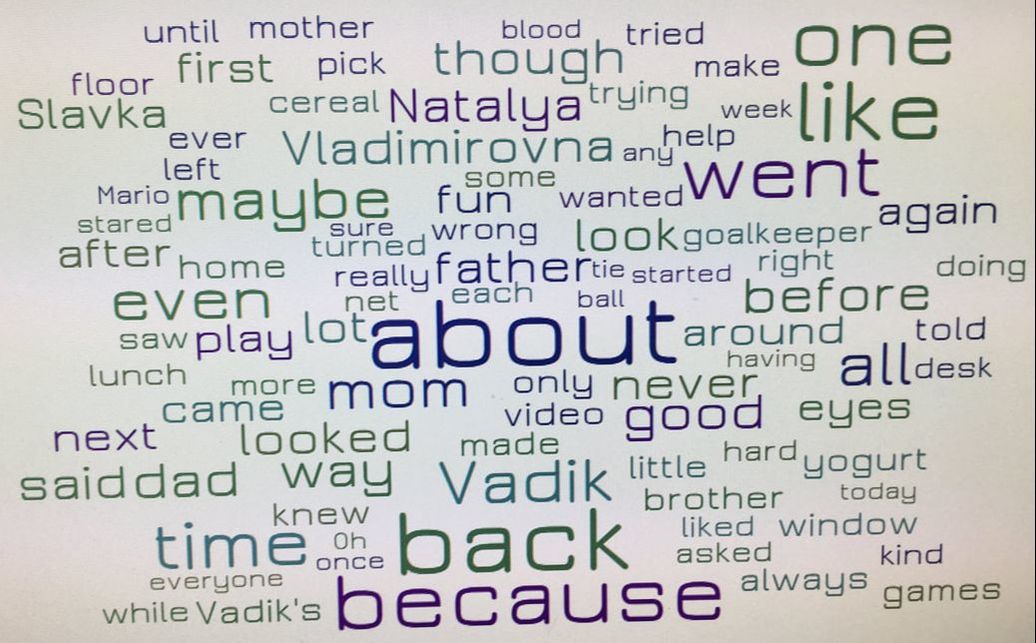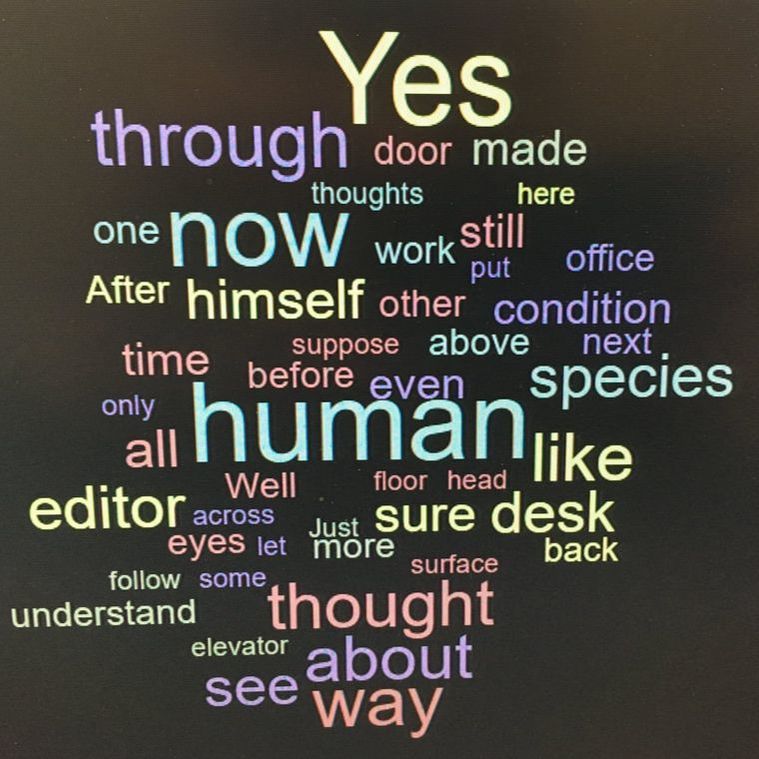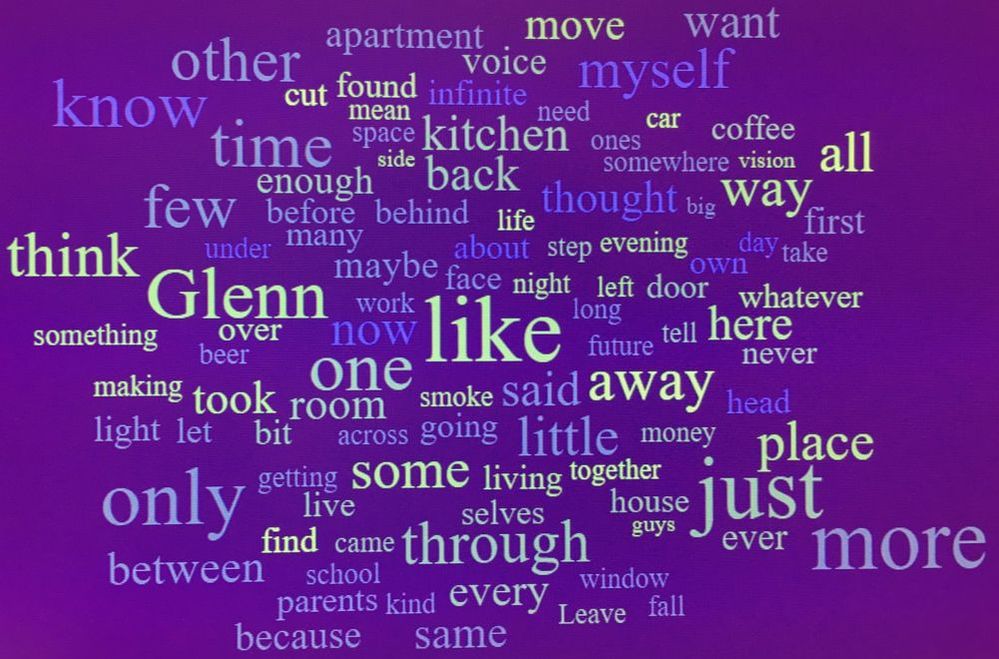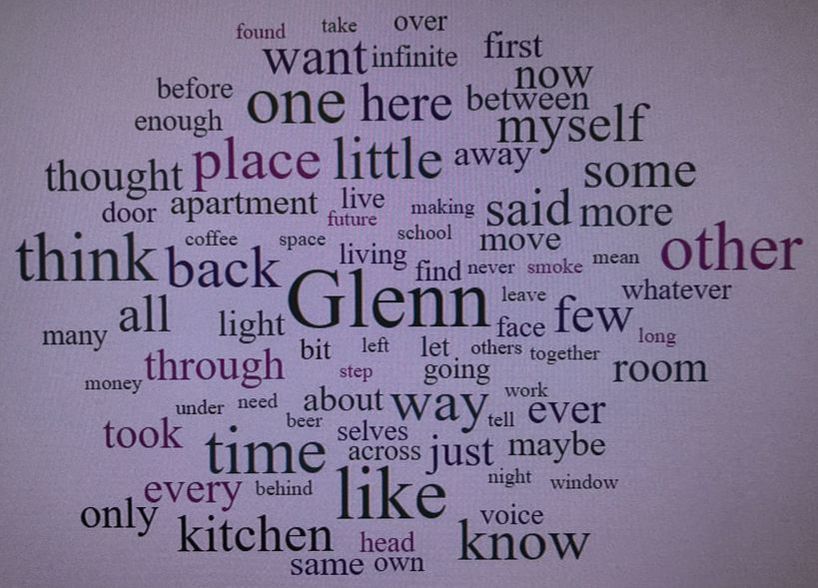Silver Wordsmith: An author's journey |
|
I often find that being a writer is a game that involves a carrot and two sticks. One stick dangles a carrot in front of you, the carrot being complete and utter satisfaction with your finished product. And the other stick is self-doubt which flagellates you as you hobble along towards the carrot you vainly try to convince yourself is pointless to reach. Anyway, that was the obligatory woe-is-me artist rant with a further obligatory disclaimer that I don’t think every writer is destined to think their writing is garbage, but we’ll never expect our writing to be perfect, which is fine, because that’s the carrot that takes us to our ultimate destination. In an earlier entry, I described some ways in which I keep myself motivated to keep writing. In this entry, I want to talk a bit about one of the tools I use to get myself to improve that writing, and that tool is word clouds. My preferred online word cloud tool is WordItOut, but feel free to find your favourite. There’s two ways in which word clouds could potentially help you, though one of them is less useful for longer pieces. The first, is trying to see if you’ve used any unusual words more frequently than you intended and as a result lessened their impact. For example, I read a history book a couple of years ago where I found the word “embryonic” used three times within a hundred pages to refer to a fledgling political movement. The first time it was a neat way to describe it. The third time felt like someone’s thesaurus malfunctioned. The way you can avoid this problem with a word cloud is throw your text in, and then study the words that appear at the bottom when sort by frequency. That way you can pinpoint the impactful words whose use short be minimized. Of course, the longer your work is, the more words you have in that low range, so it might be a tonne of work with little payoff. But try it anyway to see if there’s maybe words you really like, but whose use you should spare. Yes, it will be painful to do, but overall your writing will have more punch. The second method I’ve come to use for all my writing is using the word cloud to visualize which common words I overuse, and then track the progress I make in freeing myself from them. For example, check out this word cloud from the first draft of a story about the interaction between two Russian schoolchildren. That “about” sits there pretty heavily in the dead centre of the generated cloud. There’s nothing necessarily wrong with using the word ‘about’ – it’s a useful word, but if it’s appearing in a story so much that it takes centre stage here, then it has become a crutch word or a “junk” word. It’s the kind of word that doesn’t by itself detract from your writing, but if you challenge yourself to reduce its frequency, you may finds yourself writing simple things in more creative ways. Same with that “like” hanging out in the top right corner. A very useful word for similes, but its heightened frequency could mean either that your writing is turning into simile soup or that you need to look for different ways to introduce comparisons. For instance “he was angry like a raging inferno” could be “he was a raging inferno”; “ash landed like snowflakes on the pond” can be “snowflakes of ash landed on the pond”, and so on. I’ve once read a page of my writing that had four “like” similes across four paragraphs. Believe me, by the third instance, your eye notices it, and the writing no longer sounds polished. Mind you, I don’t mean that these words have no place in your writing. On the contrary, eliminating all use of them would be both burdensome and risks making your writing gimmicky. These are simply words that require a second look, and sometimes you’d be surprised by the results. Nor does every large word in a word cloud require a second look. While I eliminate most character names and other plot-heavy words to clean up the word cloud, sometimes you’re left with something like the following word cloud of a sci-fi story about a human writer in an alien publishing business. “Yes” sits here like a Christmas tree topper, looking completely out of place. But then I realize that one of the characters in the story has a very peculiar way of talking that relies on repeated uses of the word “yes”. I made sure I wasn’t using it so heavily that it might annoy a reader, but I certainly wasn’t going to cut down its usage in half to achieve some artificial goal. Same goes for “human” in the same word cloud. However, “through” did catch my eye. Apparently a lot of the movement in the story was “through” something, and I’d figure I’d make the movements a bit more varied, or eliminate it altogether where the description of movement didn’t add anything to the story. So how do I actually get to the result I want here? Let’s take a world cloud from an early draft of a short story about parallel universes and the local housing crisis (name me a more iconic duo …). I particularly like this example because it highlights some of my archnemeses: “like” (dead centre), “just” (bottom right) and “only” (bottom left). These have been my junk words since I started this word cloud strategy a few years ago. So what I do after I generate the word cloud is I open my Word document, and use the “Replace” function. Except instead of replacing the word itself I got to the “More” tab and then “Format” and then select “highlight”. By putting in “just” in the “Find what” field and “just” with highlight in the “Replace with” field, every instance of “just” in the story is now highlighted. I go through the list of my words, doing around 6 or 7 of the top ones to not clutter the writing with highlighted words, and then print it off. Now that the fugitive words have been highlighted, I notice them more during my editing, and eliminate them where I can. After I finish the next draft, I repeat the process. Sometimes the same words are in the top seven, so it’s a similar deal. Sometimes another word sneaks to the top and now they’re on the hit list. Keep doing this until you’re satisfied with the draft, and then behold, the word cloud for the final draft of the same short story. In hindsight, I should have eliminated “Glenn” from the earlier wordlist, but even then, you can see the results. “Like” which is in the bottom centre, has shrunk. “Only”, which is now in the bottom left corner, is considerably smaller. And “just”, which is hiding above “like” is no longer even remotely significant. I don’t know what it is with me and that word. Maybe it’s a quirk of my way of talking but it tends to seriously clutter my writing. When I edit, I find that the majority of its appearances can be deleted without editing anything around it, so I’m pretty ruthless.
I’m sure you’ve noticed that between the two clouds “think” and “know” have moved in, and I definitely had those words on my list during later drafts, but sometimes you do have to call it a day. And you know what the best part about this process is? I know I mentioned “just” as my biggest Achilles heel, but take a look at the first two clouds in this entry. “Just” is not a significant word there despite these being clouds of first drafts. By continuously drawing my attention to those words, I am naturally eliminating them from my writing. I don’t slave away trying to find better ways of saying something without using that word, but rather, I have a decreased urge to write it in the first place. So that’s my bit of advice to you. It certainly won’t make or break your writing, but I found it a very useful tool, and I hope you will too.
0 Comments
Leave a Reply. |
Michael SerebriakovMichael is a husband, father of three, lawyer, writer, and looking for that first big leap into publishing. All opinions are author's own. StoriesUrsa Major Categories
All
Archives
January 2024
|
Proudly powered by Weebly




 RSS Feed
RSS Feed